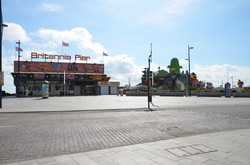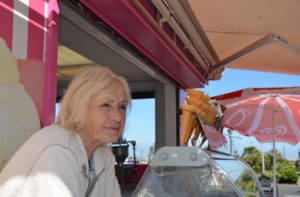
Great Yarmouth is a city that sleeps.
Its streets are blanketed in silence any time before 7am and any time after 5:30pm. I started my second day of shooting my video journalism project on a local decline in tourism with a jog along Marine Parade – a main attraction in the area. Not a soul was out on the streets apart from a lonely deliveryman dropping off the first batch of fish for an Englishman’s morning breakfast of kippers.
Although I arrived before the official tourism season kicks off – after living here a few days and speaking with locals – I have come to find that Yarmouth is a town that is tired. Tired of unemployment. Tired of minimal resources. And tired of the decline in an industry that has propped it up for so long. However, despite often-frustrated testimonial from locals, I traversed the small town by foot today and discovered some truly extraordinary sights.
I don’t begin any of my pre-arranged interviews until tomorrow – so I decided to spend today collecting man-on-the-street interviews and gathering general footage. I focused my attention on Britannia Pier and Marine Parade – the go to places for the best fish and chips, gambling, and board-walking.
Walking along Marine Parade I see a variety of people – mostly bored store owners and locals idling about. The shops on marine Parade do not vary too much – they sell fish and chips, ice cream, donuts, or beach toys for the most part. Behind the blur of all of these colorful stores whose neon colors try to capture your attention – even if only for a second – I met one woman named Julia Sweeby.

Julia was shy and reserved at first. She questioned my motives for approaching her about a video project. “It’s for school?” she said, “Well, I guess I’ll talk then.” Julia was born and raised in Yarmouth, and at 69 years old, knows the area pretty well. She has also seen the tourism decline first hand and explained to me that the biggest change has been people. The streets of Yarmouth used to be swamped with “holiday-goers.” But now, people like Julia struggle to make enough money to last over the winter. Most employment in Yarmouth (roughly 30 percent) depends of tourism. The only job Julia has been able to get is a seasonal one working as a server at an ice cream stand.
“It makes people depressed,” she said.
While sad, what Julia had to say was important. I proceeded to talk with the curator at the Time and Tide museum. Time and Tide documents Yarmouth history – including the booming tourism industry in the 50s and 60s. Joe (the curator) guided me through the exhibits and spoke about Yarmouth’s past status as a resort town with passion – a passion that sought to convince of Yarmouth’s booming past. A past that may or may not come back.
From my findings so far, the people of Yarmouth are frustrated – some even depressed. However, they take pride in a successful past and hope for success in the future. I look forward to hearing more of their stories. Stay tuned.
[portfolio_slideshow id=47]
